Fil-Ams endure Bataan Memorial Death March in New Mexico desert
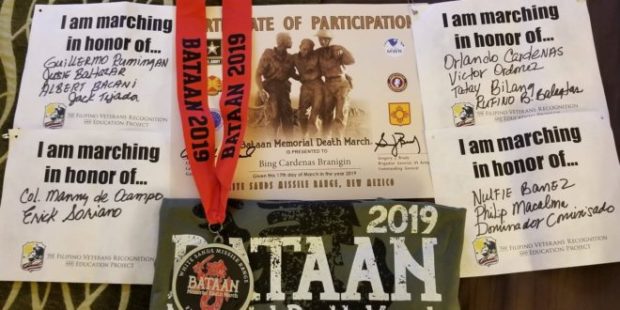
WHITE SANDS MISSILE RANGE, N.M. — To Marites Cardenas Branigin of Reston, Virginia, the 30th Bataan Memorial Death March (BMDM) held in White Sands, New Mexico recently was more than just a marathon. It was not a test of stamina, speed or skill.
Like thousands of others who lost loved ones during and after the war, she wanted to honor her uncles who served, and the many veterans she had known personally over the years who had walked the halls of Congress and protested in front of the White House demanding equity and justice.
“Most of them, like Mang Emong and Jack Tejada, are gone now,” she names two Filipino veterans who lived in the Washington DC area in the 1990s. “I walk with their spirits today, thankful for what they’ve done for our generation.”
It was Branigin’s first: lining up at the crack of dawn with wind chills at 30 degrees; trudging across a rugged desert on a sandy trail that took a heavy toll on her back and feet. Already suffering from sciatica, the 62-year-old Filipino American wife and mother thought about quitting after passing the “Mile 5” sign. She had planned to do 14.
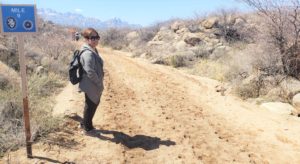
The grueling march takes a heavy toll on Bing Branigin’s feet and back, but she kept on going. INQUIRER/Jon Melegrito
But she changed her mind when she saw a double above-the-knee amputee on prosthetics walking ahead with a group of wounded warriors. “I thought if he could do it, so can I,” Branigin said. “His determination to brave the obstacles of a daunting desert terrain inspired me to surge on to the next mile, one step at a time, despite my back pains.” She persevered for eight hours to reach the finish line.
Branigin was one of 8,631 participants who signed up for the grueling march, itself a full 26-mile trek; but she opted for the 14-mile honorary trail.
Praying the rosary
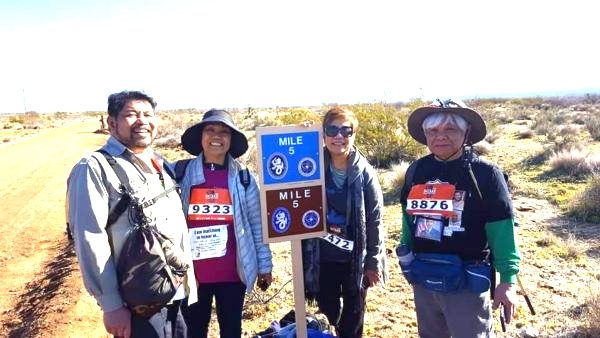
Al and Elena Cosio (left), with Bing Branigin and author, take a break by the Mile 5 sign.INQUIRER/Jon Melegrito
It was the first time as well for Al and Elena Cosio of Seattle. Also in their 60s, they are members of the Philippine Scouts Heritage Society. Upon hearing of other members’ who went to White Sands, the couple decided to do it this year. Like Branigin, Al Cosio was determined despite his physical ailments.
“It is always a humbling experience to see these survivors and their families solemnly honoring the memories of their dads who risked their lives in battle,” he said. “That’s why I came.” His wife, worried he wouldn’t make it, was praying the rosary the last four miles. “I know how much this means to him as a son of a veteran,” she said.
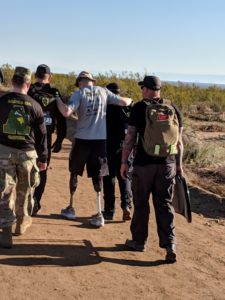
A wounded warrior on prosthetics is assisted by his comrades. INQUIRER/Jon Melegrito
Jay and Linda Cabacar of Springfield, Virginia. had just landed at DC National Airport after attending her sister’s funeral in the Philippines. Then they had to fly to San Diego, California to visit an ailing son. Despite fatigue and exhaustion, they flew to El Paso, Texas the next day to honor a commitment to serve as volunteers for the march. Jay’s brother survived the Pacific war and went on to serve in Korea. Jay heads a local chapter of the Veterans of Foreign Wars.
‘Full hearts and heavy steps’
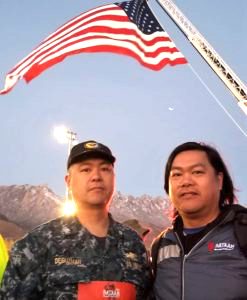
Roland and Ben de Guzman at the BMDM starting line in White Sands. INQUIRER/Jon Melegrito
Twin brothers Ben and Roland de Guzman of Paramus, New Jersey, much younger by 20 years, were there to remember not only grandparents and granduncles who made the ultimate sacrifice, but friends and colleagues – like activists Joe Montano and Dawn Mabalon – “who have left us in service.” Montano and Mabalon, both strong advocates for racial and social justice, died in their 40s. “It was a weekend full of hearts and heavy steps,” says Ben.
He coordinated national campaigns to secure legislative wins for Filipino World War II veterans, like burial benefits. “I was moved when Mang Peping Baclig told me before he died that the US government seems interested only in helping veterans die, not helping them live.”
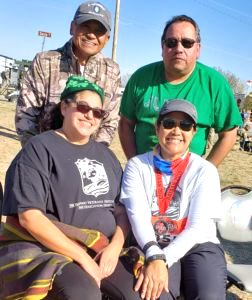
Christy Panis Poisot (seated right) with Priscilla and Manny Galvan (both volunteers from El Paso) pose for a photo with Maj. Gen. Antonio Taguba (standing, left) after the march. INQUIRER/Jon Melegrito
Christy Panis Poisot of Houston, TX. has been a regular runner for five years. A granddaughter of a Filipino veteran, Poisot organizes students and community volunteers from nearby El Paso to support the logistical needs of march participants. Her fundraising and social media skills in generating donations for the Filipino Veterans Recognition and Education Project (FilVetREP), have been valuable assets as well. “This annual event helps us raise money to purchase more medals and build a digital museum for our veterans,” she said.
From Burbank, California, 35-year-old Eireen Busa joined her parents Sonny and Ceres Busa of Alexandria, Virginia, who have been coming to White Sands every year since 2015.
Eireen’s grandfather served in the USAFEE. “There is no better symbol of American-Philippine friendship than the Bataan Memorial Death March to memorialize the shared sacrifice of Americans and Filipinos,” Sonny Busa said. “They are the true heroes.”
Filipino American participation
Branigin, the Cosios and Cabacars, the Busa family, Poisot and de Guzman brothers were part of a 28-person team of Filipino Americans led by Maj. Gen. Antonio Taguba (Ret), FilVetREP national chairman.
They came from California, Chicago, Maryland, New Jersey, North Carolina, New York, Seattle, Texas, Virginia and Washington, D.C. Most of them have done the march at least three times before.
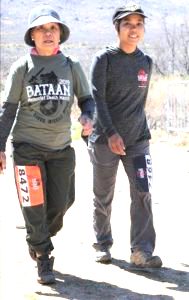
Ceres Busa and daughter Eireen both completed 14 miles. INQUIRER/Jon Melegrito
Taguba, running his fifth marathon with his son Sean, a US Army captain, brought eight members of his family this time to help as volunteers. “I’d like to see more Filipino Americans joining each year,” he said. “We want to create greater awareness about our veterans. Their story is an American story that needs to be told.”
Also joining FilVetREP’s team were ten civilian and military officers from the Philippines representing the Department of National Defense.
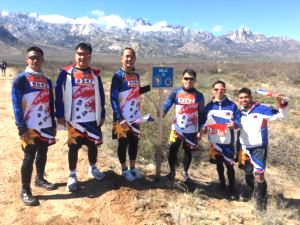
Runners from the Department of National Defense represented the Philippine team. INQUIRER/Jon Melegrito
Taguba also noted that “in our five years of participation here in White Sands, the Philippine national anthem and the Philippine flag are now sang and prominently displayed at official ceremonies, including a FilVetREP educational program that is attracting public attention.”
‘They never quit’
The day before the march, FilVetREP held its second awards ceremony as part of the BMDM weekend program. More than 300 people witnessed the presentation of the Congressional Gold Medal to 17 American and Filipino veterans who served in World War II in the Philippines.
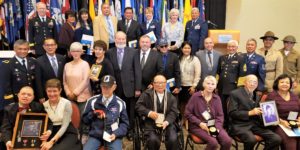
Congressional Gold Medal recipients, Philippine National Defense officials, FilVetREP leaders and White Sands Missile Range Base Commander BG Gregory F. Brady (top left) smile for the cameras after the awards ceremony. INQUIRER/Jon Melegrito
Their next-of-kin received the medals on their behalf. The award ceremony was the 56th since that epic day of October 25, 2017, when Congress formally recognized the more than 260,000 soldiers who served under the U.S. flag. More than 1,300 medals have been awarded so far.
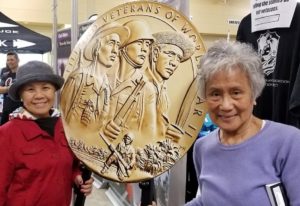
Linda Cabacar (right) and Ceres Busa at the BMDM registration hall. INQUIRER/Jon Melegrito
In his remarks at the ceremony, Taguba recalled the Rescission Acts of 1946 that stripped Filipino veterans of their rightful status, banning them from benefits and revoking their American nationality.
“This created a lifetime of indignation and injustice that still lingers to this day,” he said. “They embodied the values of the Army creed. They accomplished their mission, to never leave a fallen comrade, and they never quit. They stood firm and strong, even when their brothers died waiting for their rightful recognition.”
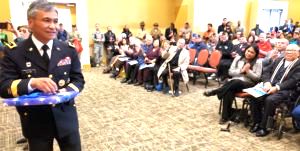
Maj. Gen. Antonio Taguba (Ret) welcomes guests and visitors to the CGM Awards Ceremony. INQUIRER/Jon Melegrito
It was in this spirit of never quitting, of remembering the fallen, of fighting for honor and recognition, that inspired the marchers in White Sands to keep on going and coming each year and, by showing up, letting the whole world know that the heroes of World War II will never be forgotten.
RELATED STORY
‘Bataan Memoria Death March’ in New Mexico draws record crowd

